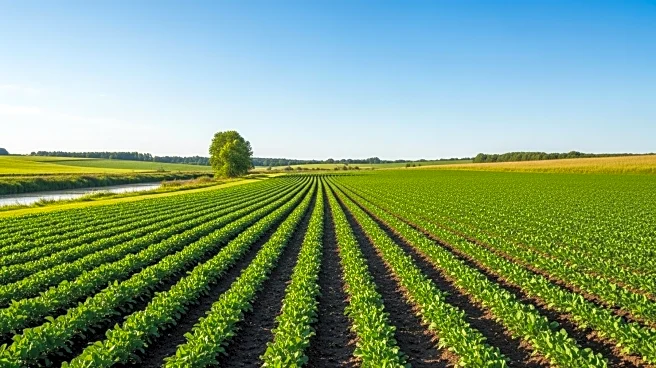What's Happening?
Dr. Philips Nto, an agricultural expert and Director of the Agribusiness Incubation Centre at Michael Okpara University of Agriculture, Umudike, has called for increased funding for agriculture in Nigeria's 2026 budget. He emphasized the importance of prioritizing agriculture to improve food security and economic prosperity. Dr. Nto highlighted the need for enhanced budgetary allocations to support agricultural yields, value addition, and the prosperity of farmers. He also advocated for the establishment of industrial agro-hubs in Nigeria's 774 local government areas, tailored to the crops grown in each region, as a sustainable approach to food security. Additionally, he suggested that agricultural subsidies be provided to genuine farmers and that agricultural extension services be revitalized to facilitate the adoption of new farming techniques.
Why It's Important?
The call for increased agricultural funding is significant as it addresses the critical role agriculture plays in Nigeria's economy. With Nigeria's revenue on the rise, investing in agriculture could lead to improved food production, reduced post-harvest losses, and enhanced economic growth. The establishment of agro-hubs and the revitalization of extension services could empower rural farmers with new techniques, boosting yields and ensuring food security. This initiative could also stimulate job creation and economic development in rural areas, contributing to the overall prosperity of the nation. The government's tax reforms, which Dr. Nto commended, could provide additional resources to fund these agricultural initiatives, further supporting the sector's growth.
What's Next?
Dr. Nto's proposals, if adopted, could lead to significant changes in Nigeria's agricultural landscape. The government may consider integrating these suggestions into the 2026 budget, potentially leading to increased funding for agriculture. The establishment of agro-hubs and the revitalization of extension services could be prioritized, with potential collaboration between federal, state, and local governments. Stakeholders, including policymakers, farmers, and agricultural organizations, may engage in discussions to explore the feasibility and implementation of these initiatives. The success of these efforts could depend on the government's commitment to allocating resources and fostering partnerships to drive agricultural development.
Beyond the Headlines
The push for increased agricultural funding highlights broader issues such as food security, rural development, and economic diversification in Nigeria. By focusing on agriculture, the country could reduce its reliance on oil revenues and promote sustainable economic growth. The emphasis on value addition and post-harvest loss reduction could lead to more efficient supply chains and increased competitiveness in global markets. Additionally, empowering rural farmers through training and support could address social issues such as poverty and unemployment, contributing to a more equitable distribution of wealth and resources.









